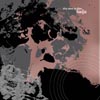Nadja, "Skin Turns to Glass"
 Released way back in the earlier part of 2008, I stupidly skipped over this improved reissue of a scarce and rarely discussed entry in the ever-expanding Nadja discography. Aidan Baker and Leah Buckareff rearranged and re-recorded each song for this release, which is easily one of their most listenable and memorable releases to date.
Released way back in the earlier part of 2008, I stupidly skipped over this improved reissue of a scarce and rarely discussed entry in the ever-expanding Nadja discography. Aidan Baker and Leah Buckareff rearranged and re-recorded each song for this release, which is easily one of their most listenable and memorable releases to date.
"Sandskin" begins the record with the kind of indistinguishable and formless buzz typical of most drone-rock outfits. It is pretty, involving, and utterly elastic. Imagining the various and distinct sounds as a unified mass is only a matter of letting the mind slip so that it can confuse the song's various features. When the rhythmic pounding that typifies the rest of the track first erupts, it spawns a dizzying effect. All the various parts (guitar, bass, drums, unidentifiable noise) seem wholly unrelated: the drums don't match the buzzing ambience and the buzzing ambience is at odds with the decidedly epic guitar wails that generate the song's forward motion. Over time these differences gel and Nadja proudly display their rock 'n' roll muscle. Chugging riffs, massive distortion, memorable melodies, and slow, deliberate arrangements are all Baker and Buckareff need to be compelling; the balls-to-the-wall character of this album is founded on that simplicity. Nadja rock on this record and forego many of the qualities that often cause writers and fans to describe them as experimental.
Still, there are plenty of devices employed on Skin Turns to Glass by which the duo obscures their heavy metal formula. Baker's guitars have a tendency to imitate analog synthesizers and the textured distortion that coats each of the four songs on Skin Turns to Glass resembles the sort of noise one might expect from Richard Pinhas or an artist on Touch. Crunchy, over-driven gusts of sound are as much a part of the record as piano melodies, heavy riffs, and pounding rhythms. Baker's solos disappear into nets of granular echo and spacious guitar reverb only to re-emerge and die a glorious, electronic death; an entire song dissolves into hushed waves of trembling strings and distorted, ambivalent moans take center stage as often as distinct instruments do. The tension created by emphasizing chaotic noise and sensible arrangements in equal doses is part of what gives this record its substantial depth. It is also what characterizes Nadja's best music.
If anything interrupts this record's consistent and potent delivery, it's the untitled closing song. It runs for nearly a half hour without doing much but humming indistinctly at a low volume. It isn't until the song is nearly over that the driving rock elements present everywhere else on the record return and conclude the album properly. While this song may have fit on another, more abstract Nadja record, it serves only to distract and debilitate on this one. Without it, Skin Turns to Glass is a wholly coherent and consistent record rooted into the power and clarity of rock music. The duo didn't need to include "Untitled" for the album to be complete. For that reason it sounds more like a curiosity than a proper part of the album.
samples:



